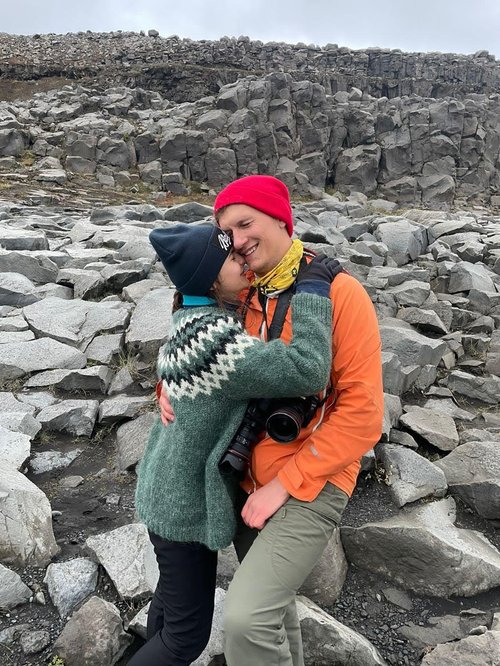My name is Anton Garbar, I am 31 years old. Of all the countries in the world, two of my favorites are Russia and Iceland. Now in each of them they treat me like a criminal. In Russia - because I opposed the attack on Ukraine, in Iceland - because I have a Russian passport.
I was born in the Kaliningrad region. By Russian standards, this is something like Iceland: a small "island" on the Baltic Sea, sandwiched between Poland and Lithuania, far from the rest of "mainland" Russia. Until recently, I lived an ordinary peaceful life, worked in a bank. In 2016, I met a wonderful girl, Victoria, who became my wife a year later. We traveled a lot together, and we wanted to show the natural beauty to other people. To do this, we opened a small travel agency. With groups of tourists we went to Europe, Japan, China and, of course, to our beloved Iceland.
Doing business in Russia is difficult, sometimes it seems that the state does not want to see private entrepreneurs. Probably because businessmen are often ambitious and independent people. If something goes wrong in the state, then such people are not afraid to ask questions. This happened to me as well. At some point, I began to notice more and more improvement problems in my city. At first, I tried to draw the attention of the authorities to these problems, even creating petitions. But the authorities ignored all appeals. From social media, I saw that this is the situation throughout the country. Human rights are being violated, but no one seems to care. And now I found myself walking in a column of protesters.
Participation in protests in Russia is always “Russian roulette”. You go and chant "Freedom to Alexei Navalny!" and “Freedom for political prisoners!”, and in response, a police sergeant shouts at you through a megaphone that he will put you in jail for 15 days. In the yards along the route of the protest column, polcie vans with cages have already lurked, and the police brutally arrest and beat random people who come to hand. Independent newspapers and social networks vividly describe what happens to those who are detained by the police at protests. Protesters can be tortured with electric shocks, beaten unconscious, or raped. None of the police officers are punished for this, and they know about it. Therefore, you are walking in a column of protesters, experiencing burning irritation from the injustice that is happening around and the fear that you will not return home today.
But it doesn't end there. All protesters are filmed by the police and street surveillance cameras. Therefore, the punishment for expressing your opinion can overtake you in a few days or even weeks. They will come to your house with a search, all bank cards will be blocked, and your phone and computer will be confiscated. And then, as luck would have it: as a maximum they will sent you to a torture prison, at least - the court will assign the official status of "foreign agent", thus declaring a person as enemy of the Russian state.
But the worst thing is that after the protests, nothing in the country changes. The majority of Russians are already accustomed to living in poverty, hearing about tortures, and submitting to injustice. At such moments, you understand that if you are arrested, then no one willprotect you.The repressive machine will chew your fate, as it did with millions of your compatriots before. The most you can hope for is that you will be mentioned in the list of undeservedly convicted sometime in 50 years.
I learned about the Russian attack on Ukraine when there was a little more than 6,500 kilometers between me and Victoria. I was with a group of tourists at the deepest lake in the world, Lake Baikal, and my wife was at home in Kaliningrad. The news came as a shock to us. At the same time, very quickly, European countries around the Kaliningrad region began to close the sky for Russian airlines. Therefore, there was a fear that my wife and I would not be able to see each other at all.
I immediately openly spoke out against the war on social networks, to which, in response, insults rained down on me from former clients, former friends, and even close relatives. Following the insults, threats began, it became dangerous to stay. We had only two options for what to do next. Either protest in Russia and be guaranteed to be arrested, or flee the country and try to influence the situation from outside.
We chose the second option. In a hurry, we left our home and went south to Kazakhstan to the wife's parents. Soon after that, officers of Russian Federal Security Service came to my mother in Kaliningrad. They were looking for me because of my anti-war posts on social networks. According to the law, Kazakhstan extradites to Russia those whom the police are looking for, and we have heard about such cases more than once. So my arrest was more a matter of timing than probability. We had to run again. This time to the west, to the only country where we had good friends and acquaintances. To Iceland.

An escape to the West is a sad tradition of the Russian and Soviet intelligentsia, which was reproduced many times in the 20th century. European countries have always been happy to host educated Russians, whose love of freedom is too dangerous from the point of view of their native country. Iceland seemed to us a magical country where human rights are certainly honored, unlike Russia.
While in Kazakhstan, we could not apply for an Icelandic visa, but we had a valid Italian visa, which gave us the right to enter the Schengen area. We flew to Keflavik on April 5, 2022 and immediately applied to the police for asylum. First we were settled in Ásbrú, and then we were transferred to the former Saga Hotel in Reykjavik. We applied for asylum at the Migration Service and got an assigned lawyer. We thought we were safe. It turned out to be wrong.
Iceland appointed us a lawyer, Vilborg Bergmann. As we learned out later, she is a specialist in family law, not immigration law. In addition, she repeatedly spoke publicly with alarmist statements of a xenophobic nature. Neither I nor my wife Victoria knew this and calmly waited for the migration service to invite us for an interview. However, strange things began to happen. We met with the lawyer only on June 8 during the interview in ÚTL, having never discussed our case with her before. The migration service officials said that this conversation would only be about the consideration of the application in Iceland, and not the application for asylum as such.
The very next day, Vilborg Bergmann told us that she thought there was an 80% chance that we would be deported. At this time, she still has not prepared the Power of Attorney, promising that she will do this in the coming days. We received this fundamental document from her only a month later. All the time we were in Iceland, we were looking for work. On June 10, we gave our lawyer a signed contract with the employer, which she promised to attach to our asylum application. On August 3, the Migration Service informed us through thelawyer that six days earlier had made a decision to refuse to consider our application for asylum in Iceland. The document claimed that the migration service considered the case on the merits, which in fact never happened. The decision did not mention our evidence of political persecution in Russia, our previous trips with tourists to Iceland, the need for psychological help due to diagnosed depression, and a work contract in Iceland. We were to be deported to Italy.
We were given 15 days to appeal the decision to the Appeal Commission. In the weeks before, Vilborg Bergman had told us that she wouldn't mind if we wanted to change lawyers and even seemed to motivate us to do so. However, when we decided to do this, she suddenly announced her refusal. With difficulty, we still managed to change lawyers. Now we were represented by Guðmundur Narfi Magnússon, who filed an appeal. In the meantime, we tried to find out about conditions for refugees in Italy. We contacted local volunteers and representatives of the state organization. We were told that they could not provide housing, benefits or work. That is, from Iceland we are deported to the streets of Milan. Despite the quality work of Guðmundur Narfi Magnússon, on October 7, the birthday of Russian President Vladimir Putin, we got refusal from the appeal commission. There were no more legal procedures for canceling deportation.
We reached out to the Icelandic media trying to get the attention Minister of Justice Jón Gunnarsson. I even managed to see him in a car near Alþingi on November 10, however, in response to my requests to accept documents about our case, he ordered the driver to leave without opening the car window. Instead of a minister, we got the attention of the Icelandic police. The day after the publication about us in the newspaper Stundin, we were called to the police station for a conversation. After a report about us on RÚV on November 7, the officers came to the Saga Hotel and told us to report to the police station every day. On November 14, we were able to personally meet with the Prime Minister of Iceland, Katrín Jakobsdóttir, and hand over our case documents to her. 15 minutes after our meeting, we received a call from the police and were informed that we would be deported on Wednesday, November 16 at 5 am.
My wife Victoria and I still believe that our case is a tragic mistake in the Icelandic migration system that can be corrected. All that is needed is a little miracle - a last-minute decision by the Minister of Justice. However, this belief, as well as the image of fair Iceland, is melting away every minute.








